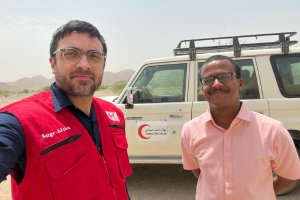On April 15, 2023, conflict broke out in Khartoum, the capital of Sudan, and quickly made its way to other regions throughout the country. This flare-up of violence was the latest threat in a region that has already endured years of violence, instability, drought, and economic hardship.
To help respond to the needs of the people of Sudan, the Canadian Red Cross deployed Bahram Ghaemi, a humanitarian expert who specializes in security measures and risk mitigation, to work alongside the International Federation of Red Cross and Red Crescent Societies (IFRC) and the Sudanese Red Crescent Society.
Collaborative safety efforts in Sudan

While in Sudan, Bahram’s job was to anticipate challenges, plan for the unexpected, and most importantly, keep the IFRC team safe.
“We work with different units to come up with all kinds of plans,” explains Bahram. “We ask ourselves, what happens if someone gets sick, or is affected by a disease, what if someone gets hurt, what if we need to leave at a moment’s notice? We examine everything, all the details.”
The role of a security expert goes far beyond anticipating and mitigating the effects of violence. In Sudan, illnesses like dengue fever and cholera are common. Ensuring the safety of those around you means that you’re responsible for taking care of the team’s health as well, from the head of the delegation to all the people that are on the ground.
“You’re making sure that everyone is safe,” says Bahram. “If anything happens at any time, we have a plan in place that we can evacuate someone, either medically or a total evacuation due to security challenges in a conflict zone. You are identifying the causes and possibilities, all while collaborating with other agencies. We ask what is our plan? What can we do?”
The Canadian Red Cross has a roster of highly skilled people like Bahram who help respond to all kinds of emergencies, both in Canada and around the world. These people have a variety of different specialized skills, which allow them to work alongside our partner National Societies when they need support.
Reflections on the humanitarian mission in Sudan
Reflecting on his mission, Bahram couldn’t help but express his reverence and respect for the Sudanese Red Crescent Society, where staff and volunteers have also experienced hardships like displacement and illnesses in the wake of the violence yet continue to respond.
“I can say Sudan made an impression on me,” says Bahram. “The level of hospitality and openness, despite being in that critical situation, they welcomed me with open arms. We ate together, shared experiences, and I felt like I found family.”
In the year since the conflict has escalated, thousands of lives have been lost, with thousands more experiencing injuries. In the last two months, the IFRC has confirmed with great sadness the passing of four Sudanese Red Crescent Society volunteers. Awad Mohamed Khalifa, Muhand AbdElrahman, Fadul Daw El-Bait Abdallah, and Bashir Shuaib were all dedicated volunteers who were killed on duty.
The IFRC, along with the Canadian Red Cross strongly condemns this violence and stresses the need to safeguard and protect humanitarian workers under all circumstances.
As of August 2024, close to 11 million people are displaced within Sudan. More than 2 million others have fled to neighbouring countries. With support from the Government of Canada, the Canadian Red Cross has sent eleven humanitarian experts like Bahram to support the response in Sudan and neighbouring countries.
During crises like this, the Canadian Red Cross relies on the flexible funding provided by our donors to the International Disaster Relief Fund to support people and communities impacted by emergencies by rapidly sending relief items, humanitarian experts, and funding to the ground.
To help people impacted by emergencies around the world—like the crisis in Sudan—please give to the International Disaster Relief Fund today.

